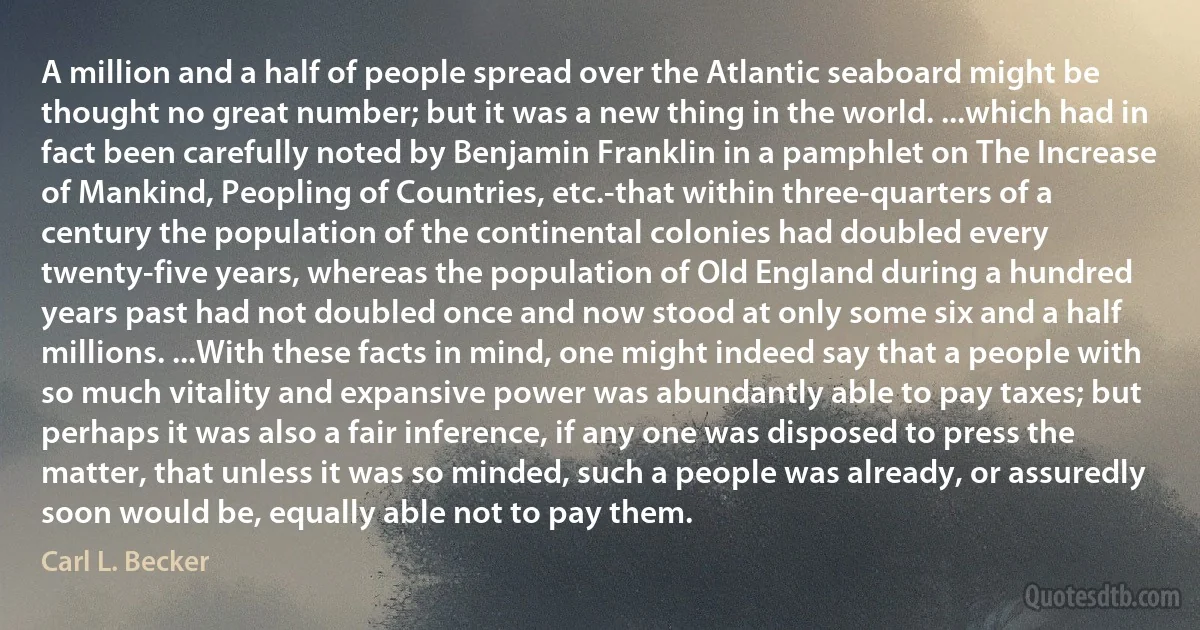
A million and a half of people spread over the Atlantic seaboard might be thought no great number; but it was a new thing in the world. ...which had in fact been carefully noted by Benjamin Franklin in a pamphlet on The Increase of Mankind, Peopling of Countries, etc.-that within three-quarters of a century the population of the continental colonies had doubled every twenty-five years, whereas the population of Old England during a hundred years past had not doubled once and now stood at only some six and a half millions. ...With these facts in mind, one might indeed say that a people with so much vitality and expansive power was abundantly able to pay taxes; but perhaps it was also a fair inference, if any one was disposed to press the matter, that unless it was so minded, such a people was already, or assuredly soon would be, equally able not to pay them.
Carl L. BeckerRelated topics
able atlantic benjamin century continental fair franklin great half hundred increase inference matter might mind now number once past pay people perhaps power say seaboard six spread stand tax thing thought vitality world etc years facts three-quartersRelated quotes
Ever since the population of this little island grew large, trade has been its livelihood. We imported food and raw materials and paid for them by exports of coal and manufactures, by earnings from shipping and other services, and by interest on foreign investments. The first world war injured our position seriously, the second had far worse effects. When we stood alone in the second world war we threw all that we had into the battle... We sold our foreign assets. We reduced our production of civilian goods to a minimum. We lost nearly all our export trade and much of our shipping... We have, therefore, to face now before we have recovered from the effects of the war, and before our long-term plans have taken effect, the necessity of relying entirely on our own resources. This is a situation as serious as any that has faced us in our long history.

Clement Attlee
Everybody knows that the great reversed triangle of land, with its base in the north and its apex in the south, which is called India, embraces fourteen hundred thousand square miles, upon which is spread unequally a population of one hundred and eighty millions of souls. The British Crown exercises a real and despotic dominion over the larger portion of this vast country, and has a governor-general stationed at Calcutta, governors at Madras, Bombay, and in Bengal, and a lieutenant-governor at Agra.But British India, properly so called, only embraces seven hundred thousand square miles, and a population of from one hundred to one hundred and ten millions of inhabitants. A considerable portion of India is still free from British authority; and there are certain ferocious rajahs in the interior who are absolutely independent.

Jules Verne
I'm here at Sandown Racecourse in Surrey. They're expecting fifteen thousand people here today and half a million pounds to be exchanged in cash. I'm here because I've developed a guaranteed system for winning at the horses. This system allows me to predict twenty four hours in advance, quite openly, which horse will win in big, high profile races. Now to prove this, six weeks ago I took a woman, a random member of the public and I told her which horse was going to win in a certain race. It did win, she was intrigued. I then did it again and again and again and she started to bet larger and larger amounts of money. Now today that woman has scraped together every last penny that she can find and she's risking it all on one final race. Is it really possible to accurately predict the winner of a horse race again and again and again? I'm going to tell you exactly how that's done. Welcome to The System.

Derren Brown
So it was that I gave about 1949 my 'Lecture on Nothing' at the Artists' Club on Eighth Street in New York City (started by Robert Motherwell), which predated the popular one associated with Philip Pavia, Bill de Kooning, et al. ). This 'Lecture on Nothing' was written in the same rhythmic structure I employed at the time in my musical compositions (Sonatas and Interludes, Three Dances, etc.). One of the structural divisions was the repetition, some fourteen times, of a single page in which occurred the refrain, 'If anyone is sleepy let him go to sleep.' Jeanne Reynal, I remember, stood up part way through, screamed, and then said, while I continued speaking, 'John, I dearly love you, but I can't bear another minute.' She then walked out. Later, during the question period, I gave one of six previously prepared answers regardless of the question asked. This was a reflection of my engagement in Zen.

John Cage
Scotland and Ireland were virtually disfranchised; Edinburgh and Glasgow, the two largest cities of Scotland, had each a constituency of only thirty-three members. A majority of the members of the House of Commons were elected by six thousand voters. This state of affairs afforded ready opportunities for the moneyed aristocracy to buy seats in Parliament, by the purchase of a few voters in rotten boroughs ; and also enabled the ministry to secure a servile majority in the Commons. The corruption resulting from these conditions, as exhibited in the latter half of the eighteenth century, can hardly be realized by the present generation. They afford, however, an illustration of the universal truth, that a government which does not draw its inspiration of liberty, justice, and morality from the people will soon become both tyrannical and corrupt.

James A. Garfield
